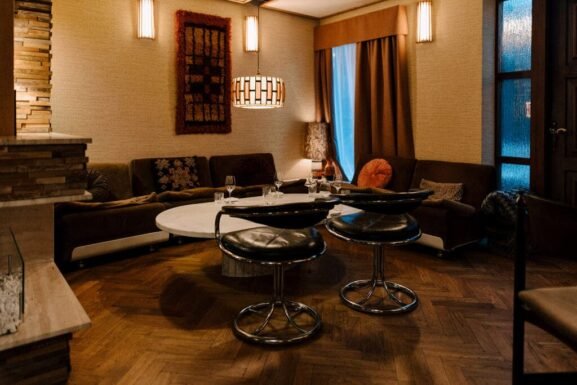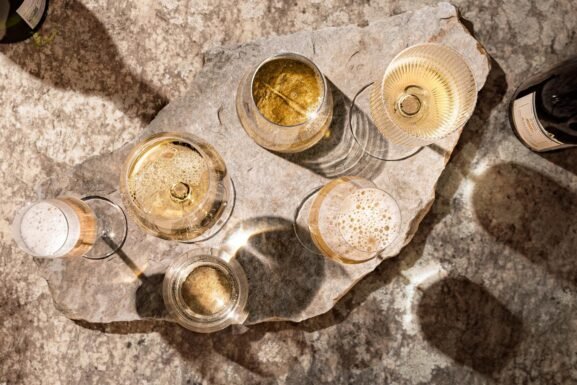Les Domaines Paul Mas: Rural Luxury in Languedoc
Deep in the verdant countryside of Southwest France, a stronghold of Gallic tradition, are the 17 Châteaux and Domaines Paul Mas. Twenty years ago, Jean-Claude Mas founded the company with a mission: To revive the stellar reputation of Languedoc wines, and to bring out the essence of each far-flung terroir. His method: Reinventing the viticultural traditions of the Languedoc while above all respecting the land and preserving its future.
Over these last two decades, the firm’s growth has been exponential. Starting with an 86-acre family plot, Les Domaines Paul Mas has thoughtfully expanded its holdings to 2,400 acres of vineyards, producing 25 million bottles annually that are distributed to more than 80 countries.
Yet, these diverse wines share a unique quality—the effortless style of “Rural Luxury.” This uniquely Languedoc version of the French art of living is a graceful blend of wines, artisan artworks and cuisine based on local produce, which is elegantly embodied at Côté Mas, a smart brasserie in the heart of Domaines Paul Mas vineyards.

The Roots of Rural Luxury
Like Jean-Claude Mas, the concept of Rural Luxury is bred from deep family roots in the region and four generations of winegrowing tradition. Wine has been Jean-Claude’s passion since he was a toddler, as he vividly recalls the time at age three when he escaped from his mother in the vineyard and ran a mile and half to find his grandfather in the cellar.
Indeed, this agrarian pedigree reaches farther back than 1892, when Jean-Claude’s great-grandfather, Auguste Mas, bought the first family vineyard. The Languedoc region has been producing wine for at least two thousand years, and legends say the region’s gifts were first noted by a heron, now known as Vinus, who preferred dining on grapes grown on the clay and limestone hills of the Hérault Valley to fish from the river. It was on this same site chosen by Auguste, six miles from the Mediterranean Sea, between Pézenas and Montpellier, that Jean-Claude started Domaines Paul Mas, named for his father.
Today, Vinus the heron has been adopted as the company’s emblem, and the Vinus estate, where vineyards yield small quantities of grapes concentrated in both color and aroma, is a signature domaine.
The high quality of Domaines Paul Mas wines across its vast portfolio is due in large part to Jean-Claude’s classic hands-on approach. “Nature is generous,” he observes, but “you need to know how to listen to best understand and accompany it.”
Every Monday, Jean-Claude crisscrosses the region to visit each estate, surveying vines to check their development and health, then adapting vineyard practices to that locale. Chemicals were banned years ago and vines are managed with minimal intervention, most under organic methods, even when not labeled as such: 80% organically farmed of which 40% are certified AB. 100% of the vineyards are certified HVE status, France’s High Environmental Value.
For Jean-Claude, organic viticulture is a key value, not a sales tool, as a core part of his strategy is growing strong, resistant grape varieties that do not need treatment. At Château Martinolles in Limoux, for example, he leaves soil fallow for five to seven years, planting cereal crops and leguminous plants before replanting vines; a natural way to bring organic material back to the soil and avoid chemical intervention.
Pioneering the Next Wave of French Wines
Known in the winemaking world as a leader of New Wave French Wines, Jean-Claude fearlessly combines his family’s heritage methods with the New World techniques he learned working in vineyards worldwide. If his ancestral tradition nurtured Jean-Claude’s profound respect for the region and a vast knowledge of wine, his university studies in economics and advertising have broadened his worldview and incited a zeal for innovation, compelling him to create a deeply French yet thoroughly modern family of wines.

On this twentieth anniversary of Domaines Paul Mas, Jean-Claude has stepped forward into uncharted territory. One fresh approach is meticulously pairing soils with grape varieties to bring out the essence of each terroir. He has perfectly acclimatized 18 grape varieties to the clay-based soils of Domaine de la Ferrandière, situated on a dried Marseillette lake. Since the vineyards sit on a bed of salt, Jean-Claude immerses the vines in water three times a year to avoid excessive salt levels.
He has also innovated irrigation methods, installing an experimental precision watering system on a parcel of Syrah in Montagnac, and added his personal touch to rosé wines, carrying out fermentation of Vinous at between 14 and 17 degrees Celsius, raising its aging potential to five years.


Quality is Luxury
“With the greatest respect for our rural roots, we aim for perfection,” declares Jean-Claude. For this new age “vigneron”, cost alone does not denote excellence, and part of Jean-Claude’s calling is to indulge wine lovers at an affordable price.
“We are all about quality,” Jean-Claude maintains, “which is, by its very nature, luxurious.”
The highest standards are imbued in labels ranging from the lighthearted Arrogant Frog, whose beret-clad toad lampoons the famed French arrogance, an ingenious humorous twist that has sold 90 million bottles internationally since its 2005 launch.
There’s a different gauge of quality in more serious releases like the Dream range, which includes highly evolved bottles from several Domaines such as Laurinya, Silénus, and Astélia, each of which are named for Jean-Claude’s four daughters. Indeed, it is at Clos Astélia that Jean-Claude has built the winery of his dreams, a facility that blends technology and aesthetics, exclusively dedicated to his most exceptional cuvées.
Jean-Claude has always seen wine as an art form and has generously hosted the region’s best local woodworkers, mosaicists, textile artists, watchmakers, painters and interior decorators. In addition, he is celebrating the launch of his limited edition Noétic Collection by commissioning 30 bottles produced by heritage crystal maker Daum, each individually decorated by well known Pop Art painter Christophe Haymann, aka CHAP.

Languedoc Rural Luxury in Every Bottle
The remarkable success of Domaines Paul Mas may be attributed in part to Jean-Claude’s awareness of a fundamental desire. “Our wines are the result of our mission to inspire real emotions,” he declares, opening a door to the most powerful of human pleasures.
Indeed, the key to this achievement may be running a large-scale operation on the principals of small, bespoke winery: blending ancient and contemporary winemaking techniques, upholding a farmer’s reverence for the land and preserving a native son’s pride in the region. The result is a taste of the Languedoc’s innate Rural Luxury, its joyful art de vivre, in every bottle of Domaines Paul Mas.To complete this notion of Rural Luxury, Domaines Paul Mas has invested equal attention in the oenotourism component of the estate, bringing the experience full circle. Guests can partake in a number of on-site activities, including horseback riding, vineyard walks, gastronomy-forward food and wine pairing experiences at The Restaurant, and more. On-site accommodations are offered at La Maison Nicole, a two-suite guest house designed with epicureans in mind and complete with a fully equipped kitchen and swimming pool access. For further details on the oenotourism offerings at Domaines Paul Mas, or to book your stay at La Maison Nicole, click here.


